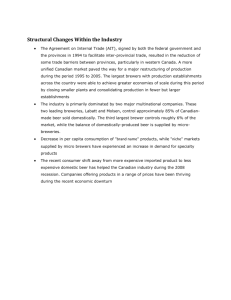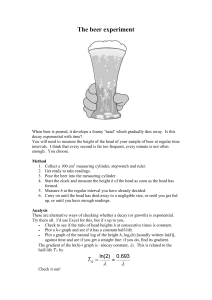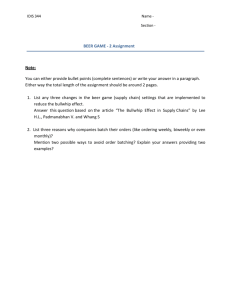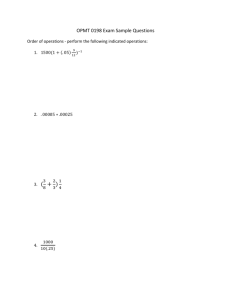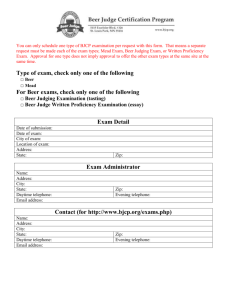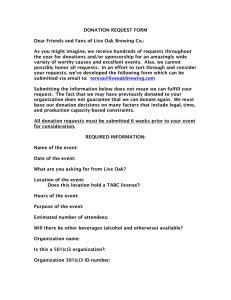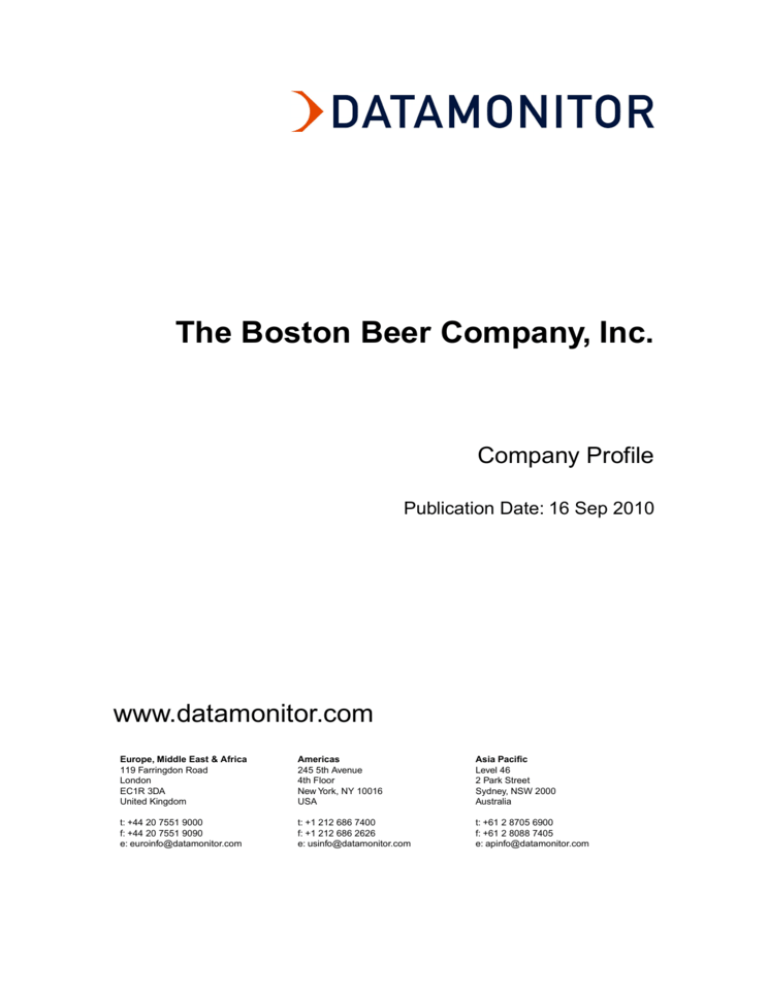
The Boston Beer Company, Inc.
Company Profile
Publication Date: 16 Sep 2010
www.datamonitor.com
Europe, Middle East & Africa
119 Farringdon Road
London
EC1R 3DA
United Kingdom
Americas
245 5th Avenue
4th Floor
New York, NY 10016
USA
Asia Pacific
Level 46
2 Park Street
Sydney, NSW 2000
Australia
t: +44 20 7551 9000
f: +44 20 7551 9090
e: euroinfo@datamonitor.com
t: +1 212 686 7400
f: +1 212 686 2626
e: usinfo@datamonitor.com
t: +61 2 8705 6900
f: +61 2 8088 7405
e: apinfo@datamonitor.com
The Boston Beer Company, Inc.
ABOUT DATAMONITOR
Datamonitor is a leading business information company specializing in industry analysis.
Through its proprietary databases and wealth of expertise, Datamonitor provides clients with unbiased
expert analysis and in depth forecasts for six industry sectors: Healthcare, Technology, Automotive,
Energy, Consumer Markets, and Financial Services.
The company also advises clients on the impact that new technology and eCommerce will have on
their businesses. Datamonitor maintains its headquarters in London, and regional offices in New
York, Frankfurt, and Hong Kong. The company serves the world's largest 5000 companies.
Datamonitor's premium reports are based on primary research with industry panels and consumers.
We gather information on market segmentation, market growth and pricing, competitors and products.
Our experts then interpret this data to produce detailed forecasts and actionable recommendations,
helping you create new business opportunities and ideas.
Our series of company, industry and country profiles complements our premium products, providing
top-level information on 10,000 companies, 2,500 industries and 50 countries. While they do not
contain the highly detailed breakdowns found in premium reports, profiles give you the most important
qualitative and quantitative summary information you need - including predictions and forecasts.
All Rights Reserved.
No part of this publication may be reproduced, stored in a retrieval system or transmitted in any form by any means, electronic,
mechanical, photocopying, recording or otherwise, without the prior permission of the publisher, Datamonitor plc.
The facts of this profile are believed to be correct at the time of publication but cannot be guaranteed. Please note that the
findings, conclusions and recommendations that Datamonitor delivers will be based on information gathered in good faith
from both primary and secondary sources, whose accuracy we are not always in a position to guarantee. As such Datamonitor
can accept no liability whatever for actions taken based on any information that may subsequently prove to be incorrect.
The Boston Beer Company, Inc.
© Datamonitor
Page 2
The Boston Beer Company, Inc.
TABLE OF CONTENTS
TABLE OF CONTENTS
Company Overview..............................................................................................4
Key Facts...............................................................................................................4
SWOT Analysis.....................................................................................................5
The Boston Beer Company, Inc.
© Datamonitor
Page 3
The Boston Beer Company, Inc.
Company Overview
COMPANY OVERVIEW
The Boston Beer Company (Boston Beer) is engaged in production and sale of low-alcohol beverages.
The company operates in the US. It is headquartered in Boston, Massachusetts and employs about
780 people.
The company recorded revenues of $415.1 million during the financial year ended December 2009
(FY2009), an increase of 4.2% over 2008. The increase was primarily due to increases in net selling
prices. The operating profit of the company was $54.3 million in FY2009, as compared to an operating
profit of $14.1 million in FY2008. The net profit was $31.1 million in FY2009, as compared to net
profit of $8.1 million in FY2008.
KEY FACTS
Head Office
The Boston Beer Company, Inc.
One Design Center
Suite 850
Boston
Massachusetts 02210
USA
Phone
1 617 368 5000
Fax
1 617 368 5500
Web Address
http://www.bostonbeer.com
Revenue / turnover 415.1
(USD Mn)
Financial Year End
December
Employees
780
New York Stock
Exchange Ticker
SAM
The Boston Beer Company, Inc.
© Datamonitor
Page 4
The Boston Beer Company, Inc.
SWOT Analysis
SWOT ANALYSIS
Boston Beer is the largest craft brewer and the largest independently-owned brewer overall in the
US. In FY2009, the company sold approximately two million barrels of its proprietary products and
brewed or packaged approximately 200,000 barrels under contract for third parties. A strong market
position provides Boston Beer with significant competitive advantage as well as stabilizes the
company's financial growth. However increasing prices of raw materials may adversely affect the
margins of the company.
Strengths
Weaknesses
Strong market position coupled with robust
brand equity
Initiatives to reduce dependence on third
party breweries
Robust results amidst a weak economic
backdrop
Lack of scale compared to industry
behemoths
Product recall tarnishing brand image and
financial performance
Opportunities
Threats
Distribution agreement with Moosehead
Breweries
Growing Hispanic population in the US
Growing Craft Beer category in the US
Rising raw material prices could adversely
affect margins
Booming trade of counterfeit alcohol
Negative outlook for beer market in Europe
Strengths
Strong market position coupled with robust brand equity
Boston Beer is the largest craft brewer and the largest independently-owned brewer overall in the
US. In FY2009, the company sold approximately two million barrels of its proprietary products and
brewed or packaged approximately 200,000 barrels under contract for third parties. The company’s
Samuel Adams is the third largest brand in the Better Beer category of the US brewing industry. In
terms of end customer base, the company sells its products to a network of approximately 400
wholesale distributors, who then sell to retailers such as pubs, restaurants, grocery chains, package
stores, stadiums and other retail outlets. Boston Beer’s strong market position is strengthened by
its robust brand equity. For instance in 2009, Boston Beer was named the “Supplier of the Year” by
William B. Darden restaurants, Outback Steak House and TGI Fridays. Further in an annual
TAMMARON survey that ranks brewers in terms of supplier performance in nine different categories,
Boston Beer Company ranked first in eight of the nine categories and for the first time ranked as the
top brewer supplier overall. Strong brand equity enables the company to retain a strong bargaining
The Boston Beer Company, Inc.
© Datamonitor
Page 5
The Boston Beer Company, Inc.
SWOT Analysis
position with retailers. Furthermore, a strong market position provides Boston Beer with significant
competitive advantage as well as stabilizes the company's financial growth.
Initiatives to reduce dependence on third party breweries
Globally, as the number of available breweries has declined, the risks of disruption have increased,
and the dynamics of the brewery strategy of ownership versus brewing in breweries owned by others
has changed. Boston Beer has historically pursued a strategy of combining brewery ownership with
production arrangements at breweries owned by third parties. The brewing services arrangements
with breweries owned by others have historically allowed the company to utilize excess capacity,
providing the company flexibility, as well as cost advantages over its competitors, while maintaining
full control over the brewing process for the company's beers. However, in 2007 and 2008, due to
concerns about expected future availability and pricing of brewing capacity at breweries owned by
others and the company's desire to better control its brewing future and to improve efficiencies and
costs long term, the company initiated several steps designed to reduce its dependence on breweries
owned by others. These steps included the acquisition of substantially all of the assets of a brewery
located in Breinigsville in Lehigh Valley, Pennsylvania from Diageo North America in 2008. From
2007 to 2009, core product volume brewed at company-owned breweries increased from
approximately 35% to over 95%. Boston Beer expects to brew over 95% of core product volume in
2010 at company-owned breweries. Reduced dependence on other breweries enhances productivity
and in turn boosts its profitability.
Robust results amidst a weak economic backdrop
While the overall US beer sales declined amidst a weak economic backdrop, the sales at Boston
Beer witnessed a steady increase. The net sales of the company increased at a compounded annual
growth rate CAGR (2007-2009) of 10%. Furthermore, for the first time, Boston Beer surpassed the
two million barrel mark in 2009. Also, in a year when many beer brands saw a 7%-10% dip in
on-premise sales, the company’s Samuel Adams’ on-premise sales witnessed an increased sales.
The depletions of the company’s products, or distributor sales to retailers, increased approximately
3% in 2009, as compared to 2008. Additionally, the company also registered a strong balance sheet
in FY2009. Boston Beer had no long-term debt at the end of December 2009. This implies that it
has no interest obligations which in turn can result in stable earnings for the company.
Strong results in the current market scenario of recession and downturn strengthens Boston Beer’s
sustainability and stability.
Weaknesses
Lack of scale compared to industry behemoths
Despite being the largest craft brewer and the largest independently-owned brewer overall in the
US, Boston Beer lacks the scale to compete effectively with its competitors in the beverage industry.
The Boston Beer Company, Inc.
© Datamonitor
Page 6
The Boston Beer Company, Inc.
SWOT Analysis
During 2008, SABMiller and Molson Coors Brewing Company combined their US operations into a
joint venture, MillerCoors, and InBev completed its acquisition of Anheuser-Busch, creating
Anheuser-Busch InBev. Today, these two major brewers comprise over 94% of all United States
domestic beer production, excluding imports. Further, these two major brewers have entered the
Better Beer category recently, either by developing their own beers, acquiring, in whole or part,
existing craft brewers, or by importing and distributing foreign brewers’ brands. Apart from this, in
January 2010, Heineken entered into an agreement to acquire the beer operations of Fomento
Economico Mexicano, SAB de CV (FEMSA Cerveza) which will make Heineken the number two
brewer internationally by revenue and significantly increase Heineken’s ownership position in the
Better Beer Market with the addition of FEMSA Cerveza brands.
Scale is crucial to cost leadership in the beer industry because the brewing process requires heavy
investment in plant and equipment, and a significant proportion of brewers' costs are fixed. Although
there is some loyalty to beer brands, consumers usually have a choice of lager in both on-premise
and off-premise channels, so switching costs are low. Boston Beer's lack of scale means that it is
unlikely to generate the excess returns on invested capital enjoyed by the global leaders in the
brewing industry. Thus, lack of scale hinders Boston Beer a competitive advantage and also reduces
its bargaining power in the fiercely competitive market.
Product recall tarnishing brand image and financial performance
Boston Beer Company in 2008 was involved in a voluntary recall of select 12 oz glass bottles of its
Samuel Adams beer which contained small grains or bits of glass. This was the first recall of the
company since its founding in 1984. The recall negatively impacted Boston Beer’s 2008 operating
results before tax by $22.7 million and its 2008 net income by $12 million. The estimated net income
per dilutive share effect was $0.84 for 2008. Product recalls like these indicate inadequate quality
assurance and quality control systems. Also, recurrent product recalls will not only affect the brand
image of the company but also impact its financial performance.
Opportunities
Distribution agreement with Moosehead Breweries
Boston Beer and Moosehead Breweries (Moosehead), in February 2010, entered into a five-year
distribution agreement under which Moosehead and its subsidiary, The Premium Beer Company,
will assume the Canadian distribution of Boston Beer’s portfolio including its flagship brand Samuel
Adams Boston Lager. Moosehead is the largest independent brewery in Canada. Boston Beer can
leverage Moosehead’s strong presence in Canada to establish a strong footprint and increase its
revenues and profitability.
Growing Hispanic population in the US
The Boston Beer Company, Inc.
© Datamonitor
Page 7
The Boston Beer Company, Inc.
SWOT Analysis
Hispanics are the most rapidly growing ethnic group in the US. They are also becoming increasingly
affluent, increasing their importance to marketers. The Hispanic population in the US is projected
to jump from 35.2 million in 2000 to 102.6 million in 2050, 24.4% of the US projected population.
Furthermore, according to industry sources, the purchasing power for Hispanics will also increase
significantly from $860,000 million in 2007 to a projected $1.2 trillion by 2012. The demand for
beverages from the Hispanic population is on the rise in the US. As Boston Beer mainly operates
in the US, this trend could result in further increase in the demand for company's products in the
future.
Growing Craft Beer category in the US
Despite the weak outlook for the overall beer sales, the Craft Beer category is on the rise in the US.
The Craft Beer category grew approximately 5%, while the Better Beer category was down 2% to
4% and the total beer category was down 1% to 2% in 2009. Furthermore, Craft beer sales soared
12% in value and 9% in volume in January to June 2010, compared to a US beer market that fell
about 3% during the same period. According to industry sources, craft beers will continue to outgrow
the overall US beer market during the next few years. Boston Beer is the largest craft brewer in the
US. The company is thus well positioned to exploit the growing Craft Beer category in the US and
enhance its top line and profitability.
Threats
Rising raw material prices could adversely affect margins
Barley and molasses are the key raw ingredients used in alcohol production. The price of barley has
increased at an annual rate of 13% in the last two decades because of the booming ethanol market.
The increase is partly because farmers are devoting less acreage to the grain in favor of more
lucrative crops, especially corn. The malt and barley prices raised more than 32% per hectoliter (on
a constant currency basis) in FY2009. The prices of barley and malt are further expected to rise in
the coming period.
Also, the company faces an increasing threat of volatility in prices of molasses. The tight molasses
market is prompting the companies to call for extra imports in order to avoid shortages in the market.
An increase in the prices of raw materials may adversely affect the margins of the company.
Booming trade of counterfeit alcohol
The sale of counterfeit alcohol is increasing globally. Counterfeit alcohol refers to the selling of cheap,
fake alcohol under reputed brand names. As per the International Federation of Spirits Producers
reports, counterfeit alcohol leads to an estimated $1,000 million loss annually. The trend is only
expected to grow in the future. Besides revenue losses, counterfeits alcohol products also affect the
company's brand value since the taste and composition are of poor quality. Moreover it could hit the
customer confidence as the fake product does not give the desired results promised by the brand.
The Boston Beer Company, Inc.
© Datamonitor
Page 8
The Boston Beer Company, Inc.
SWOT Analysis
It then becomes increasingly difficult for companies like Boston Beer, to win back disillusioned
customers, since their revenues are mostly driven by brand loyalty. An increasing counterfeit market,
hence, would affect the company both in terms of brand equity as well as revenue.
Negative outlook for beer market in Europe
The beer market in Europe has witnessed a significant decline in its value and volume in the recent
times. In FY2008, as per Datamonitor's report, the Europe beer market shrank by 0.4% to reach a
value of $223,200 million. By FY2013, the European beer market is forecasted to have a value of
$218,100 million, a decrease of 2.3% since FY2008. Furthermore, the European beer market volume
is forecasted to reach 43,400 million liters by FY2013, a decrease of 5% since FY2008. Although
Boston Beer sells its products predominantly in the US, it also has markets Europe. The negative
outlook in this region will have adverse impact on the revenues and margins of Boston Beer.
The Boston Beer Company, Inc.
© Datamonitor
Page 9
Copyright of Boston Beer Company, Inc. SWOT Analysis is the property of Datamonitor Plc and its content
may not be copied or emailed to multiple sites or posted to a listserv without the copyright holder's express
written permission. However, users may print, download, or email articles for individual use.

